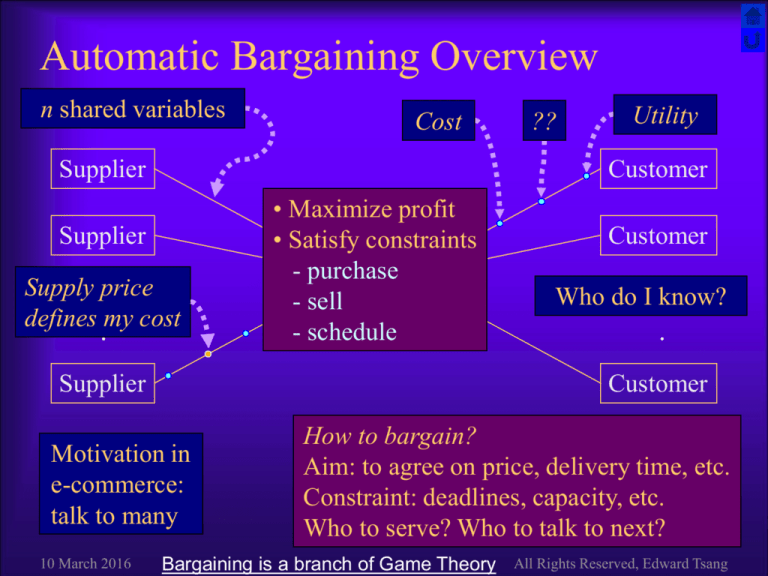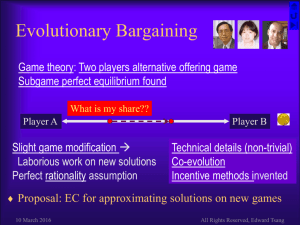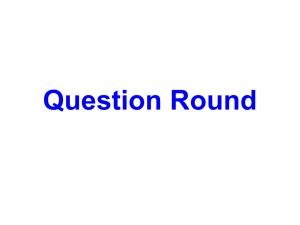
Automatic Bargaining Overview
n shared variables
Cost
Supplier
Utility
Customer
Supplier
Supply ·price
defines ·my cost
·
• Maximize profit
• Satisfy constraints
- purchase
Me
- sell
- schedule
Supplier
Customer
·
Who do I ·know?
·
Customer
Motivation in
e-commerce:
talk to many
10 March 2016
??
How to bargain?
Aim: to agree on price, delivery time, etc.
Constraint: deadlines, capacity, etc.
Who to serve? Who to talk to next?
Bargaining is a branch of Game Theory
All Rights Reserved, Edward Tsang
Bargaining work at CCFEA
Complex
eg supply chain
Simple
Bargaining
Bargaining games
Evol. Comp.
Rubinstein
Theory
IPD
Design?
No
information
10 March 2016
Mathematical Solutions
(neat)
Approx?
Realistic Problems
TAC /
SSCM
Simple
Procedures (scruffy)
Evolve?
Exact?
Perfect
information
All Rights Reserved, Edward Tsang
Bargaining Theory
Abhinay Muthoo
http://www.essex.ac.uk/economics/
people/staff/muthoo.shtm
Bargaining in Game Theory
Rubinstein Model:
= Cake to share between A and B (= 1)
In reality:
A and B make alternate offers
Offer at time t(x= f=(rA–, rxB,) t)
xA = A’s share
B
A
Is
it
necessary?
rA = A’s discount rate
Is
(What
rational?)
t = it# rational?
of rounds, at
time Δisper
round
0
xA
– Both players rational
– Both players know everything
B
Decay of Payoff over time
0.6
0.5
0.4
Payoff
Important Assumptions:
xB
A
A’s payoff xA drops as time goes by
A’s Payoff = xA exp(– rA tΔ)
?
0.3
0.2
0.1
0.0
Time t
0
1
2
3
4
5
6
7
8
9
10
Equilibrium solution for A:
A = (1 – B) / (1 – AB)
where i = exp(– ri Δ)
10 March 2016
Optimal offer:
xA = A
at t=0
Notice:
No time t here
All Rights Reserved, Edward Tsang
Bargaining is a branch of Game Theory
Game theory is a mathematical framework
– A set of methods and tools
– For studying strategic situations
Bargaining games constitute the most classic
class of games
– It involves conflicts (we both want a bigger share)
– It need cooperation (we both need a deal asap)
Repeated Games is another big class of games
10 March 2016
All Rights Reserved, Edward Tsang
Terminology in bargaining theory
Optimal – doing what is best for oneself
– In bargaining, what is best for me depends on what
the other player does
Subgame – now and at any point in the future
Subgame Perfect Equilibrium (SPE)
– Each player deploys a strategy that is best for her at
each and every subgame
– Optimal strategy by both players
10 March 2016
All Rights Reserved, Edward Tsang
Iterative Prisoner’s
Dilemma
Axelrod’s experiments
Tit-for-tat
Prisoner’s Dilemma
Player A
Payoffs
Cooperate
Player
B
Cooperate
Defect
1
1
Defect
0
4
4
0
2
2
• What’s the optimal decision for A (or B)?
• What if this game is repeated?
10 March 2016
All Rights Reserved, Edward Tsang
Iterated Prisoner’s Dilemma (IPD)
Axelrod organized two tournaments in 1980
– Round one: 14 entries
– Round two: 62 entries from 6 countries
Tit-for-Tat was the winner in both runs
– Start by cooperation
– Then follow whatever the opponent did last round
GRIM is an alternative local optimum
– Like Tit-for-Tat, except being unforgiving
10 March 2016
All Rights Reserved, Edward Tsang
Trading Agents Competition
for E-Commerce
Maria Fasli
http://cswww.essex.ac.uk/staff/mfasli
Trading Agents Competition (TAC)
Classic Game (Thalis)
– Simultaneous auctions with substitutable and
interrelated goods
– Dynamic bid configuration depending on historical
data, current state and
projected state
– Application of Strategic
Demand Reduction
– Domain-specific heuristics
– 3rd and 4th positions in TAC
2003 and 2004 respectively
10 March 2016
All Rights Reserved, Edward Tsang
TAC Work at Essex
Supply Chain Management Game (Socrates)
– An agent acts as a reverse auctioneer with the suppliers in
multi-attribute auctions with substitutable and interrelated
goods. Suppliers use a reputation mechanism and their
delivery may be partial or complete
– Dynamic scheduling for
production and delivery
– Ordering strategy and
factory utilisation are
interdependent and crucial
– ICEC-03: 7th position
10 March 2016
All Rights Reserved, Edward Tsang
Local Constraint Optimisation
Agreed price
Cost
Seller
Sell by date
Utility
Buyer
Buy by date
Every agent is self-centred
Agents constrain each other
The simplest form of local constraint satisfaction /
optimisation above
– All deeper research depends on strategy in this problem
10 March 2016
All Rights Reserved, Edward Tsang
Game Theory Hall of Frame
1994
Nobel
Prize
John Harsanyi John Nash Reinhard Selten
2005
Nobel
Prize
Robert Aumann
Thomas Schelling
2012
Nobel
Prize
Alvin Roth
Lloyd Shapley
1994 Nobel Economic Prize Winners
John
Harsanyi
(Berkeley)
Incomplete
information
10 March 2016
John Forbes
Nash
(Princeton)
Non-cooperative
games
Reinhard Selten (Bonn)
Bounded rationality
(after Herbert Simon)
Experimental
economics
All Rights Reserved, Edward Tsang
1978 Nobel Economic Prize Winner
Artificial intelligence
“For his pioneering research into the decision-
making process within economic organizations"
“The social sciences, I thought, needed the same
kind of rigor and the same mathematical
underpinnings that had made the "hard" sciences
so brilliantly successful. ”
Bounded Rationality
– A Behavioral model of Rational Choice 1957
Herbert
Simon
(CMU)
Artificial
intelligence
Sources: http://nobelprize.org/economics/laureates/1978/ http://nobelprize.org/economics/laureates/1978/simon-autobio.html
10 March 2016
All Rights Reserved, Edward Tsang
2005 Nobel Economic Prizes Winners
Robert J. Aumann, and
Thomas C. Schelling
won 2005’s Noel
memorial prize
in economic sciences
For having enhanced our
understanding of conflict
and cooperation through
game-theory analysis
Robert J.
Aumann
Thomas C.
Schelling
75
84
Source: http://www.msnbc.msn.com/id/9649575/ Updated: 2:49 p.m. ET Oct. 10, 2005
10 March 2016
All Rights Reserved, Edward Tsang
Robert J. Aumann
Winner of 2005 Nobel Economic Prize
Born 1930
Hebrew Univ of Jerusalem & US National
Academy of Sciences
“Producer of Game Theory” (Schelling)
Repeated games
Defined “Correlated Equilibrium”
– Uncertainty not random
– But depend on info on opponent
Common knowledge
10 March 2016
All Rights Reserved, Edward Tsang
Thomas C. Schelling
Winner of 2005 Nobel Economic Prize
Born 1921
University of Maryland
“User of Game Theory” (Schelling)
Book “The Strategy of Conflict” 1960
– Bargaining theory and strategic behavior
“Book Arms and Influence” 1966
– foreign affairs, national security, nuclear strategy, ...
Paper “Dynamic models of segregation” 1971
– Small preference to one’s neighbour segregation
10 March 2016
All Rights Reserved, Edward Tsang
Alvin E Roth
Winner of 2012 Nobel Economic Prize
Born 1951
Columbia, Stanford
“Game theory for real world problems”
Case study in game theory
– Stable Marriage Problem
– National Resident Matching Problem
10 March 2016
All Rights Reserved, Edward Tsang
Lloyd Shapley
Winner of 2012 Nobel Economic Prize
Born 1923
UCLA
Mathematical economics
Game theory
– Including stochastic games
– Applications include the stable marriage problem
Shapley-Shubik power index
– For ranking planning and group decision-making
10 March 2016
All Rights Reserved, Edward Tsang








